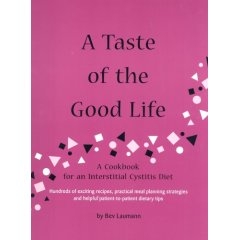IC Diet & St. Johns Wort – Fresh Tastes by Bev
By Bev Laumann, Author of A Taste of The Good Life: A Cookbook for IC & OAB
St. John’s Wort, a perennial herb that grows in many places in the U.S., has received a lot of press lately as an over-the-counter “natural antidepressant”. In contrast to the constipation and drowsiness that accompany prescription tricyclic antidepressants, St. John’s wort has been touted as relatively free of those drawbacks (though it may cause fatigue, dry mouth, or dizziness). Interstitial cystitis patients often take antidepressants for their IC, so it’s no wonder that St. John’s wort interests us. Unfortunately, some IC patients who have tried it find that it increases their bladder pain.
One possible explanation for such a reaction may be the activity of the primary active ingredient in St. John’s wort, hypericin. While hypericin does inhibit the reuptake of the neurotransmitter serotonin (much as the tricyclic antidepressants do), it also inhibits an enzyme (monoamine oxidase) which is responsible for breaking down tyramine in the body. This enzyme inhibition could be one reason why St. John’s wort adversely affects some IC patients.
Tyramine is a substance produced by the body and is also manufactured by bacteria from protein. It can be found in large amounts in many of the foods that IC patients say cause them bladder problems. Aged and fermented foods like cheeses, soy sauce, sauerkraut, and some cured meats are extremely high in tyramine. Other foods that are “no-no’s” on the IC diet have substantial amounts of it too. Tyramine has effects in the body similar to adrenaline (increased blood pressure, redirected blood flow, etc) and doctors have long suspected that, for some people at least, dietary tyramine may exacerbate conditions like IC and migraines. Those who are interested in trying St. John’s wort for their IC may want to pay particular attention to their diet.
References:
- D. M. Gardner, K. Shulman, S. Walker, et al. The Making of a User Friendly MAOI Diet. Journal of Clinical Psychiatry, Vol 57, #3, 1996.
- S. M. Borowitz. Alternative Therapy: Focus on Herbal Products. Pediatric Pharmacotherapy, Vol 4, #5, 1998.
- E. Portyans. Alternative Medicine. Drug Topics, Vol 142, #7, 1998.
Purple Passion Smoothie
If you love those low-fat fruit-and-yogurt smoothies but you bladder doesn’t, try this one. Though it’s far from low in fat or calories, it’s a refreshing occasional treat that avoids the acid and tyramine of yogurt.
- 1/2 c. washed, fresh, chilled blueberries
- 1-1/2 c. vanilla ice cream
- 1/2 c. cold milk
- 2 chilled glasses
- Place all ingredients in a blender and process until smooth and frothy, about 45 seconds. Pour into chilled glasses and serve. Makes about 2-1/4 cups. Frozen blueberries work fine too. Women with vulvodynia as well as IC may want to avoid this beverage due to the high oxalate content of the blueberries, but for most IC patients blueberries are often tolerated as well as pears.
Variations: I’ve tried substituting cottage cheese curds for about 1/4 cup of the ice cream (just curds, not whey, rinsed under running water). On occasion I’ve also made this more of a “meal” by adding 2 Tbsp. of pure high-protein egg white powder.
Though I haven’t tried it, a friend mentioned making this with MochaMix non-dairy dessert instead of ice cream. (While some IC patients have no problems with non-dairy dessert, watch out for the IBS-provoking guar gum in it if you have irritable bowel syndrome).

